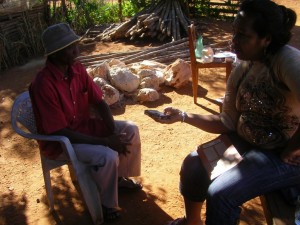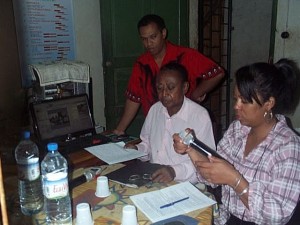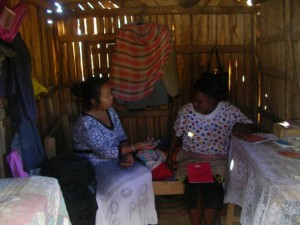Moving forward since last year, much has happened with ALT’s Village Voices for Development radio project…
The VVD Project undertook an evaluation of its impacts on local communities between August and September 2012 with excellent results ( the study will be up on the ALT website soon) and Adsum Foundation funded an extension to the project from October in order to maintain vital production and broadcast while the ALT Mg team awaited news from the EC on funding to adapt VVD for the national elections communications campaign.
The ALT Mg team filmed testimony from a member of the community who had experienced a life changing event thanks to the VVD broadcasts – see http://www.andrewleestrust.org/voices.htm
During October to December, as well as tackling land rights, public security and justice topics, the ALT MG team began producing and broadcasting programmes about the 2013 elections for audiences in the Androy region, working with the radio listening groups and partner radio stations who have participated in VVD since last February
The elections is a new subject for the project’s team as well as for the listeners. Focus groups with villagers revealed that beneficiaries had insufficient information or understanding to fully participate in the process (eg voter registration, census etc ).
Accordingly two programmes were produced in October in order to provide information and prepare listeners so they could participate in debates and discussions, and enable them to pose questions – including for a future phone in debate.
One programme explained the CENIT (Commission Electorale Nationale Independent pour la Transition) a description of its agencies and activities, and the electoral process already underway (eg voter enrollment: -a definition, the persons responsible, and the procedures) . A second programme focused on the national Census of voters.
Feedback suggested that listeners were interested in the topic; the programmes were well received and well understood and more programming was required.
A radio phone-in was then produced on December 14 at Radio CACTUS Ambovombe. An invitation was sent to the Regional Manager of CENIT Ambovombe, Mr. John Emanuel RASOLONDRAIBE; who agreed to participate and answer questions from listeners. The phone-in lasted 1 hour and questions focused principally on :
- The exact date of the election; will the election really take place?
- An explanation request for the conduct of the Census in the District of Ambovombe Androy, specifically regarding the deficiencies found in the method of carrying out the steps of the census. Indeed, there were cases such as non-completion of door to door surveys, use of a predefined list of the population during the census and visits to the population, many households were not visited by the census agents. All these were exposed during the radio phone-in.
- The request for clarification and precision on the making of national Identity cards.
- The boundaries of the validity of the electoral card, in other words, is it still valid if the person moves to another location.
- Questions on the minimum age to vote (eg if a person has not yet had 18 years old during the census period but only reaches this age some time before the date of the election, can that person participate to the election? What should she do?)
- The definition of CENIT and its role
- The work already done by the CENIT and further activities
Value of the VVD Extension Phase – Lessons Learnt
ALT is enormously grateful to Adsum Foundation for supporting three additional months to the pilot phase.
A number of lessons have been learnt during this extension and, importantly, the listeners have been able to revisit themes that interest them and which required more work, exchange and programme production : – land tenure and inheritance issues, and public security. They were also able to begin to get a grasp of entirely new themes and information that is essential to their participation in forthcoming 2013 elections and in their judicial system locally.
The team also identified some key lessons for election programming:
1) To enable listeners to be comfortable with discussing the elections topic, the Project needs to start the radio phone-in with an introduction or a presentation which can serve as a guide for discussion.
2) The local radio station team also need special training on this specific topic (i.e the Election, the CENIT etc ) in order to better assist the phone in and to provide coverage of the elections
3) Radio phone-ins on issues concerning Elections must be continuous and evolve according to the context to assure continuity of interest for listeners and to help them better assimilate information and key messages. Also to enable them to better express their questions and concerns.
A further two programmes were produced about the CENIT and elections which reiterated
and further reminded listeners of key information shared during the radio phone-in of December.
EC Funded National Elections Communciation Campaign
The team learnt in December 2012 that the VVD project had been selected to become part of the EC funded national elections communication campaign. Although funding and time constraints do not permit the full methodology to be rolled out across all the regions of Madagascar, targeted activities will ensure there is civic engagement about the elections in the media (radio) across 11 linguistic zones and programming will be shared as widely as possible.
Additionally, the work that ALT Mg executed on election themes during the VVD extension phase between October -December enabled them to learn many lessons and to prepare for and anticipate challenges in the forthcoming communications work with the EC project. In January 2013, when they were called to commence planning they were quick to work with their new international partner in Tana, Search for Common Ground, and also with the EC and the CENIT national office. ALT Mg were able to rapidly provide questionnaires for the baseline survey, delineate the linguistic zones of the project, identify key radio stations and elaborate the criteria for selecting and working with these media partners.
As of now, ALT Mg has trained and mobilised its field team for the election communications campaign (including with ex ALT Project Radio staff in Fianarantsoa), and they are carrying out an initial survey. Given there is such a short lead in time to the elections this gives ALT an advantage, enabling them to better assist and support the local populations through the process in the coming months.



